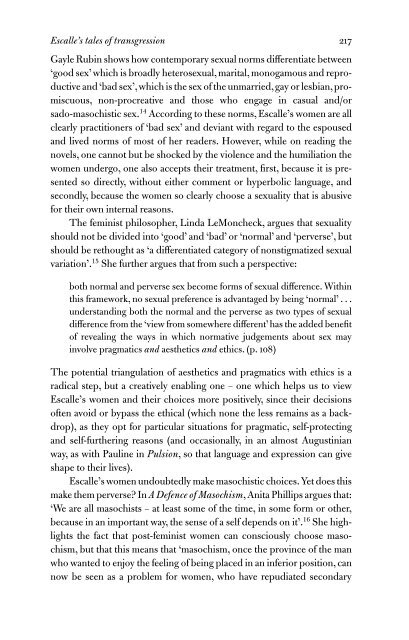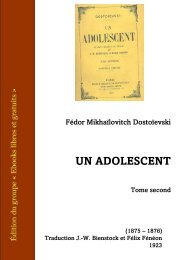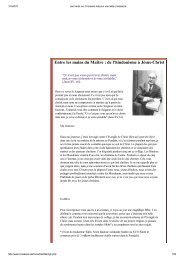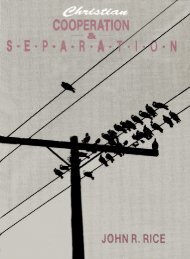Women writing in contemporary France
Create successful ePaper yourself
Turn your PDF publications into a flip-book with our unique Google optimized e-Paper software.
Escalle’s tales of transgression 217<br />
Gayle Rub<strong>in</strong> shows how <strong>contemporary</strong> sexual norms differentiate between<br />
‘good sex’ which is broadly heterosexual, marital, monogamous and reproductive<br />
and ‘bad sex’, which is the sex of the unmarried, gay or lesbian, promiscuous,<br />
non-procreative and those who engage <strong>in</strong> casual and/or<br />
sado-masochistic sex. 14 Accord<strong>in</strong>g to these norms, Escalle’s women are all<br />
clearly practitioners of ‘bad sex’ and deviant with regard to the espoused<br />
and lived norms of most of her readers. However, while on read<strong>in</strong>g the<br />
novels, one cannot but be shocked by the violence and the humiliation the<br />
women undergo, one also accepts their treatment, first, because it is presented<br />
so directly, without either comment or hyperbolic language, and<br />
secondly, because the women so clearly choose a sexuality that is abusive<br />
for their own <strong>in</strong>ternal reasons.<br />
The fem<strong>in</strong>ist philosopher, L<strong>in</strong>da LeMoncheck, argues that sexuality<br />
should not be divided <strong>in</strong>to ‘good’ and ‘bad’ or ‘normal’ and ‘perverse’, but<br />
should be rethought as ‘a differentiated category of nonstigmatized sexual<br />
variation’. 15 She further argues that from such a perspective:<br />
both normal and perverse sex become forms of sexual difference. With<strong>in</strong><br />
this framework, no sexual preference is advantaged by be<strong>in</strong>g ‘normal’ . . .<br />
understand<strong>in</strong>g both the normal and the perverse as two types of sexual<br />
difference from the ‘view from somewhere different’ has the added benefit<br />
of reveal<strong>in</strong>g the ways <strong>in</strong> which normative judgements about sex may<br />
<strong>in</strong>volve pragmatics and aesthetics and ethics. (p. 108)<br />
The potential triangulation of aesthetics and pragmatics with ethics is a<br />
radical step, but a creatively enabl<strong>in</strong>g one – one which helps us to view<br />
Escalle’s women and their choices more positively, s<strong>in</strong>ce their decisions<br />
often avoid or bypass the ethical (which none the less rema<strong>in</strong>s as a backdrop),<br />
as they opt for particular situations for pragmatic, self-protect<strong>in</strong>g<br />
and self-further<strong>in</strong>g reasons (and occasionally, <strong>in</strong> an almost August<strong>in</strong>ian<br />
way, as with Paul<strong>in</strong>e <strong>in</strong> Pulsion, so that language and expression can give<br />
shape to their lives).<br />
Escalle’s women undoubtedly make masochistic choices. Yet does this<br />
make them perverse? In A Defence of Masochism, Anita Phillips argues that:<br />
‘We are all masochists – at least some of the time, <strong>in</strong> some form or other,<br />
because <strong>in</strong> an important way, the sense of a self depends on it’. 16 She highlights<br />
the fact that post-fem<strong>in</strong>ist women can consciously choose masochism,<br />
but that this means that ‘masochism, once the prov<strong>in</strong>ce of the man<br />
who wanted to enjoy the feel<strong>in</strong>g of be<strong>in</strong>g placed <strong>in</strong> an <strong>in</strong>ferior position, can<br />
now be seen as a problem for women, who have repudiated secondary


















